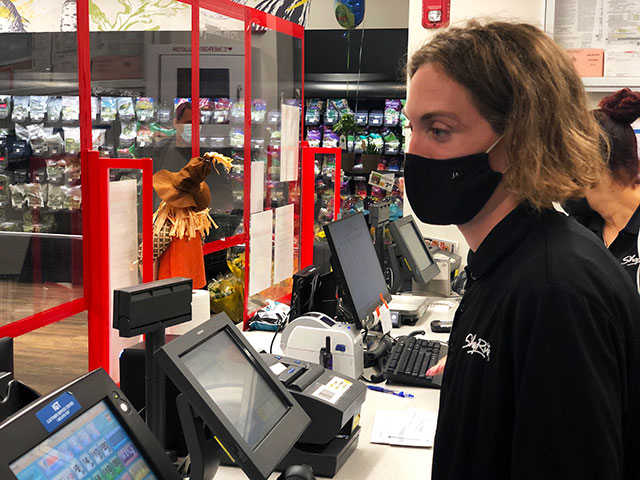Pandemic Toll on Grocery Workers

By Amman Ahmad
When most retail workers were sent home by the pandemic, grocery workers were declared essential workers who had no choice but to venture out. Some had to work longer or more numerous shifts.
During the lockdowns, grocery staff were seen as critical, much like those in the medical profession, yet in some ways they were given fewer protections. Now in October 2020, seven months into the pandemic, grocery store workers are still facing possible contagion, compromised mental health from stress and long work days. But, worst of all, say some workers, is dealing with unreasonable customers. At least 68 grocery staff have died and more than 10,000 have been infected by or exposed to the coronavirus, according to the United Food and Commercial Workers union (UFCW).
Alison Soriano works at the local Foodtown in East Harlem. “Customers just tend to forget that we are humans too,” said the Manhattan native. “During the beginning of the pandemic, we had tons of customers run amuck into the store. The store would be full of people racing to buy disinfectant wipes, toilet paper and more but the thing is they weren’t wearing masks.”
Yet the stress from dealing with customers only increased as the pandemic slowed down. Mask compliance is uneven, putting the cashiers in an uncomfortable, potentially unsafe, situation. “They’d say that they can’t breathe whatsoever,” says Soriano on those who refuse to wear a mask. “It makes our jobs even more stressful. I am a cashier, I need to focus on the line, not if people are wearing masks. It puts us at risk.”
The annual mean income for grocery store cashiers in 2019 was $24,990 according to the U.S. Bureau of Labor Statistics (BLS). Only 51 percent were eligible for employer-sponsored health insurance, according to the Kaiser Family Foundation. If retail workers were to fall ill, only 64 percent had paid sick leave as of March 2019, according to the BLS. Many Blacks and Latinoes (24%) work in the service industry, increasing their risk for COVID infection.
UFCW International President Marc Perrone in a May press call said grocery employers need to do more. “Most states and supermarket chains are still failing to enforce social distancing or mask wearing in stores to keep customers and workers safe.” Perrone also called on large employers to be transparent about infected employees.
Christian Torres commutes from Forest Hills, Queens, to work at a Shoprite in Bruckner Plaza in The Bronx. He’s been working there since October 2019. Torres says his workload has really increased. “In the start of the pandemic, many of my co-workers had either left, or they were let go,” says Torres. “The rest of us had to pick up the slack. I need the money, so I offered to pick up any shifts available, not everyone can get unemployment y’know.”
Even months after the pandemic’s peak in New York City, social distancing guidelines have prevented more people from being hired, increasing the workloads for the market workers. “Whenever I work the lines, in the beginning of the pandemic it seemed like these lines would never end!” says Torres. “It’s still the case now. One day I would end up working inventory lugging heavy boxes to even working the meat section moving packages. It’s rough.”
The tough workloads are even more demanding for those like Christian, who have a two-hour commute to their jobs. “Eventually it begins to take a toll on you physically, commuting then working even harder, sometimes even mentally,” said Christian.
With low pay and little to no incentives working during this pandemic, many are wondering if they should even continue their jobs, especially with all that they deal with.
“I wanted to zone myself out from the world, these conditions are absolutely horrid,” said a distraught Awilda Guzman, who works at the Golden Mango supermarket located in Castle Hill, in the Bronx. “My anxiety almost made me want to quit. I’m a single mother of two. I need to provide for them, but I don’t want to give them the virus if I become infected.”
Many companies have decided to encourage mental health awareness, like Golden Mango managers. The need for mental health practices have increased significantly, writes Chris Cooley in The Shelby Report, a site dedicated to the supermarket and grocery industry. “The psychological toll of working in public spaces such as a grocery store during the pandemic has been and continues to be significant.”
Guzman says she need to be there for my kids. “I am the representation they need, I pushed for my co-workers to do the same,” she says. “This heavy workload in a serious time is critical, the community needs these items. But I am grateful that it is much better now than it was in April. Thank the Lord.”
Saved under Coronavirus, Featured Slide, News
